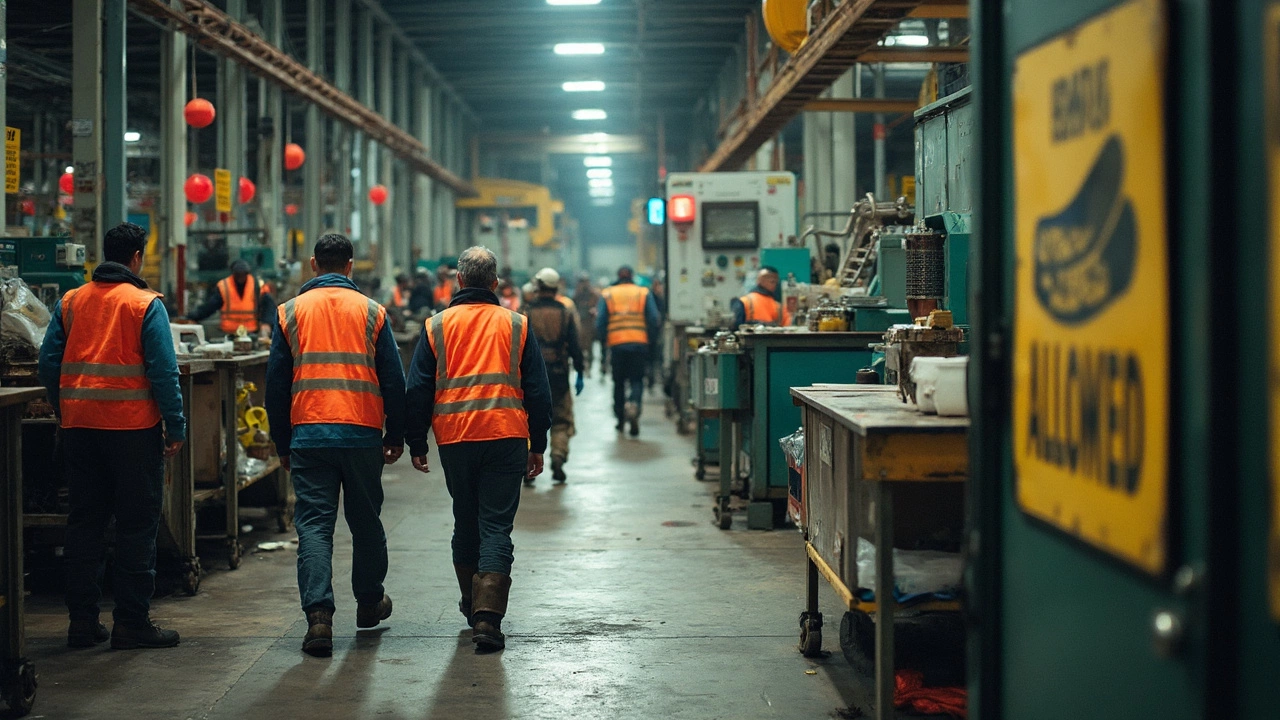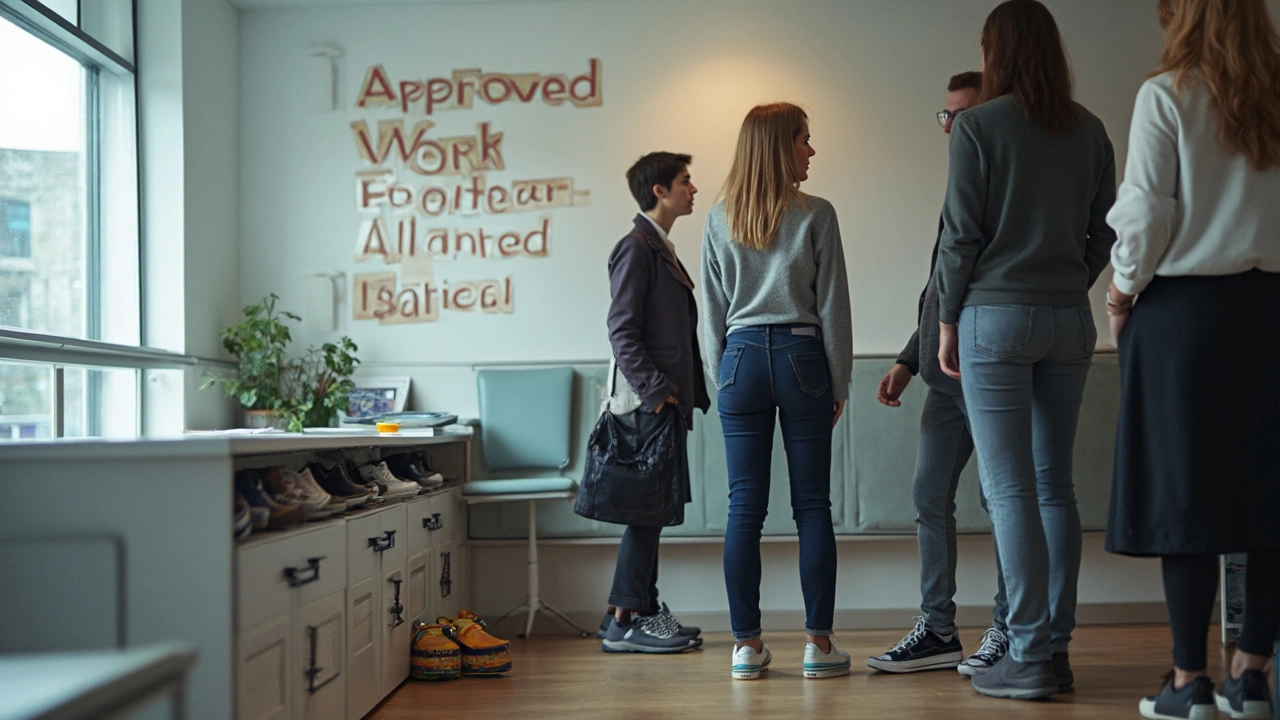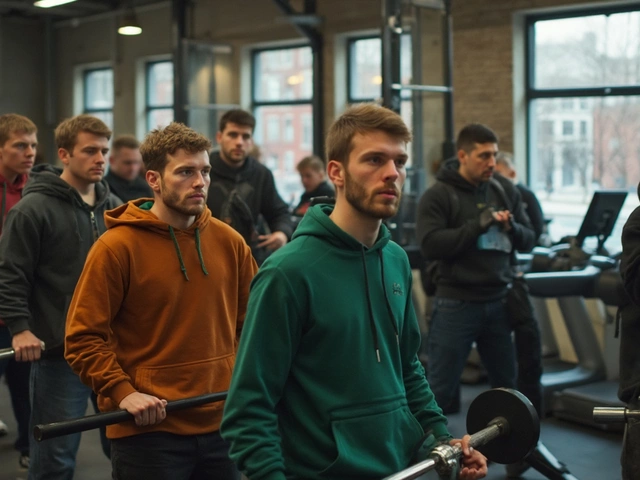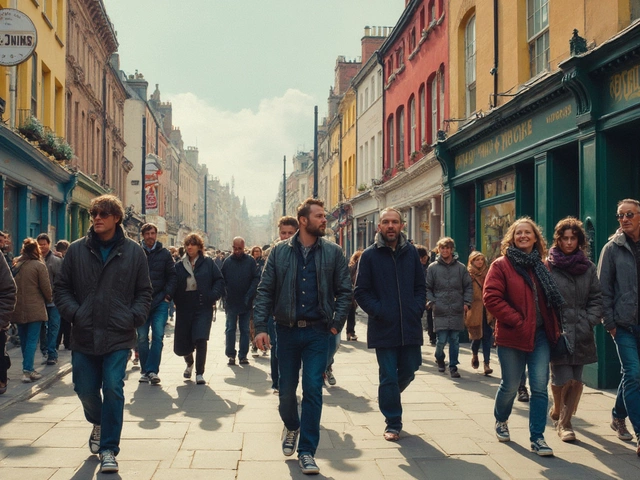Walk down Grafton Street or into any Irish home after a long rainy day and you’ll probably spot someone padding around in Crocs. But once you show up for work, those colourful clogs aren’t just frowned upon—they’re often flat-out banned. Why’s that? It’s not about being old-fashioned or snobbish. Here in Ireland, shoe rules at work tie closely to health and safety laws, insurance, and what bosses reckon is ‘proper’ professional style.
If you’ve ever tried to make a case for wearing Crocs to your manager at the Bank of Ireland or a busy café in Cork, you’ve probably heard every reason under the sun: “They’re not safe!”, “It’s not the image we want!”, “What if Health & Safety pays us a visit?” Yet these rules can feel confusing, especially for anyone who’s grown used to the practical side of Crocs between rainy school runs or gardening at home in Galway.
- The Crocs Craze Hits Ireland
- Irish Workplaces and Shoe Rules
- Health, Safety, and Crocs: What the Law Says
- Smart Tips: Stay Comfy and Meet the Rules
The Crocs Craze Hits Ireland
Crocs landed in Ireland in the early 2000s and, love them or hate them, you can’t argue with their popularity. Across Dublin, Cork, and Limerick, you’ll spot them on teens, parents, even the occasional grandparent pushing a buggy through the shopping centre. What’s the draw? Crocs are lightweight, easy to clean, and they shrug off the endless Irish rain far better than canvas runners. They’ve even made appearances at local music festivals like Electric Picnic, where comfort is king after a long day jumping in muddy fields.
Crocs aren’t just a hit for home and leisure. During the pandemic, hospital workers in Ireland wore them because they could be washed and disinfected quickly—leading to a spike in sales at outlets like Elverys Sports. Kids wear them to the beach in Bundoran; campers swear by them for slipping on at Glendalough campsites. In fact, Irish retail data from 2023 shows Crocs sales soared by 42% year-on-year, especially among 18-25 year-olds.
Check out some local numbers:
| Year | Crocs Pairs Sold (Thousands) |
|---|---|
| 2021 | 63 |
| 2022 | 81 |
| 2023 | 115 |
Shops like Schuh in Blanchardstown Centre regularly feature Crocs in prominent window displays. Even Penneys hopped on the trend with budget versions last summer. Still, while everyone loves their comfort, there’s a big gap between rocking Crocs in the car park at SuperValu and wearing them on the job at an office or restaurant. The real issue isn’t style—it’s how Crocs fit with Crocs at work Ireland policies.
Irish Workplaces and Shoe Rules
If you’ve worked anywhere in Ireland, from a Spar in Limerick to a big tech office in Dublin’s Docklands, you’ll know there’s usually a policy for what you can wear on your feet. These rules can vary a lot depending on the type of job, but one thing is nearly universal: Crocs just don’t fit the bill for most workplaces. What’s surprising is how seriously some employers take this—sometimes it’s written into your contract, or sitting right at the top of the employee handbook under ‘Dress Code’.
For offices, hospitality jobs, retail, and especially anything health or food-related, companies lay out clear guidelines. They want shoes to look neat, cover your toes, and not risk you slipping or hurting yourself. Why the big deal? Insurance companies often check if employers are enforcing these standards, and a lot of work injuries in Ireland are caused by slips, trips, and falls—which dodgy footwear can make worse.
- Crocs at work Ireland—most companies, like Tesco, SuperValu, and the HSE, have official rules against open-back, loose, or ‘casual’ shoes.
- Offices expect closed, smart-looking shoes. Even in ‘relaxed’ tech offices, Crocs stick out for the wrong reasons.
- In hospitals and kitchens, shoes need to be non-slip and fully closed up. That’s not just fussy—public safety inspectors (like the HSA) can actually give out fines if staff aren’t following guidelines.
If you’re on building sites, there’s zero chance Crocs are allowed. Certified safety boots are a must. Here’s a quick look at some common Irish jobs and their basic shoe requirements:
| Job Type | Required Footwear |
|---|---|
| Office (Admin/Tech) | Closed, clean, ‘business casual’ shoes |
| Retail (Grocery, Shops) | Black, closed-toe, non-slip shoes |
| Hospitality (Restaurants, Cafés) | Fully closed, non-slip, water-resistant shoes |
| Healthcare (Hospitals, GP Clinics) | Closed, non-slip, easy-to-clean shoes—never open heel |
| Construction | Steel-toe or certified safety boots |
Some places are strict to the point of sending staff home if they show up in the wrong shoes. And at bigger organisations—say, Lidl HQ or an Irish Life office—it’s not just about what the boss thinks. HR and health & safety officers keep an eye out. Breaking the rules can even get you written up or cost you a shift.

Health, Safety, and Crocs: What the Law Says
Before you even think about showing up in Crocs at your job in Ireland, you need to know how strict the rules actually are. The Health and Safety Authority (HSA) sets out clear standards for safety footwear in workplaces—especially where there’s any risk of burns, slips, chemicals, or heavy objects falling on your toes. This covers everywhere from construction sites in Dublin to kitchens in Limerick cafés.
The big issue with Crocs is their open design and flimsy protection. Most of the popular Crocs don’t have toe caps, proper grip, or any resistance to sharp items—total red flags in Irish safety guidelines. Slip-resistance is another big problem, especially in wet food prep areas, storerooms, or anywhere with heavy foot traffic. Here’s the thing: under Irish regulations, it’s the boss’s job to make sure everyone wears proper shoes that match the risks at work.
| Workplace | Footwear Requirement | Crocs Allowed? |
|---|---|---|
| Hospital or Healthcare | Closed-toe, anti-slip | No* |
| Kitchen/Catering | Closed, oil-resistant, non-slip | No |
| Building Site | Steel-toe, non-slip | No |
| Office | Closed, professional-looking | Rarely |
| Retail/Shop | Secure, presentable | Depends |
*You might spot brand-approved medical clogs in some hospitals—these look like Crocs but are much tougher, fully closed, and pass safety checks.
Irish insurance companies also play hardball. Claims for workplace accidents often get turned down if the employee wore unsuitable shoes, and Crocs usually land in that category. The upshot is, even if you work somewhere that feels relaxed, if your shoes don’t meet safety rules, both your boss and you could be in for a headache if anything goes wrong.
- Always check your employee handbook—most companies spell out shoe rules.
- If you really need something comfy, ask about certified, closed-heel medical clogs. Some Irish hospitals will list the brands they allow, like Toffeln or Suecos.
- If you’re working in retail or food, only wear Crocs marked ‘work’ with anti-slip certification—and still double-check with your supervisor first.
Irish shoe shops and companies selling workwear, like Arnotts, Pat Lenehan Safety, and SafetyDirect.ie, all carry HSA-approved options. Plenty of styles are miles more comfortable than what you might imagine when you hear ‘safety shoe.’
Smart Tips: Stay Comfy and Meet the Rules
Missing your Crocs but still want to beat the usual foot pain at work? Loads of people in Ireland feel the same way, especially if you're on your feet all day in a shop, at the Aviva Stadium, or even behind a pharmacy counter in Limerick. But you don’t have to just suck it up or splash out on shoes that look sharp but make you wince after lunch.
Here’s how you can stay comfy and still keep your boss and HR folks happy:
- Crocs at work Ireland: Stick to closed-toe, non-slip shoes if your job requires standing, walking, or lifting. This isn’t just about following the dress code—Irish employers actually risk big insurance headaches if someone gets injured in dodgy shoes. Places like SuperValu or Tesco have clear no-Crocs policies for this reason.
- Look for shoes with memory foam or cushioned insoles—brands like Skechers and Clarks are easy to find in shops across Ireland and get good reviews from retail and hospitality staff for comfort and safety.
- If you work somewhere like St. James’s Hospital or even a school, ask HR about branded work shoes. Some Irish employers supply or subsidise safe, comfy shoes as part of your uniform allowance. You might be surprised how many do it (especially in hospitals).
- If foot sweat is your nightmare, get moisture-wicking socks. You can easily find them at Penneys or even at your local Intersport Elverys. They help, especially during muggy Irish summers.
- Bounce pads or orthotic inserts are game-changers if you’re stuck with basic shoes, especially for pub staff during Cork Jazz Festival weekends or big match days in Croke Park.
Here's a quick look at what matters most for keeping your feet happy during long Irish workdays:
| Feature | Works for Irish Workplaces? | Where to Find |
|---|---|---|
| Closed-Toe/Non-slip | Usually required in retail, healthcare, food jobs | O'Flynn's Shoes, Clarks, Skechers |
| Memory Foam | Recommended for standing jobs | Skechers, Woodies (DIY shoes) |
| Breathable Material | Helps in stuffy indoor jobs | Penneys, Marks & Spencer |
| Orthotic Inserts | Makes standard shoes comfier | Boots, Elverys |
Nobody’s saying you have to walk around work like you’re in Sunday best all week. But swapping Crocs for a pair of safe, comfy work shoes means you stay onside with Irish rules and keep your feet in good nick. Watch for workplace notice boards or union updates—they sometimes tip you off to footwear deals or group orders most people miss.


